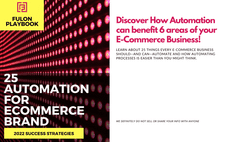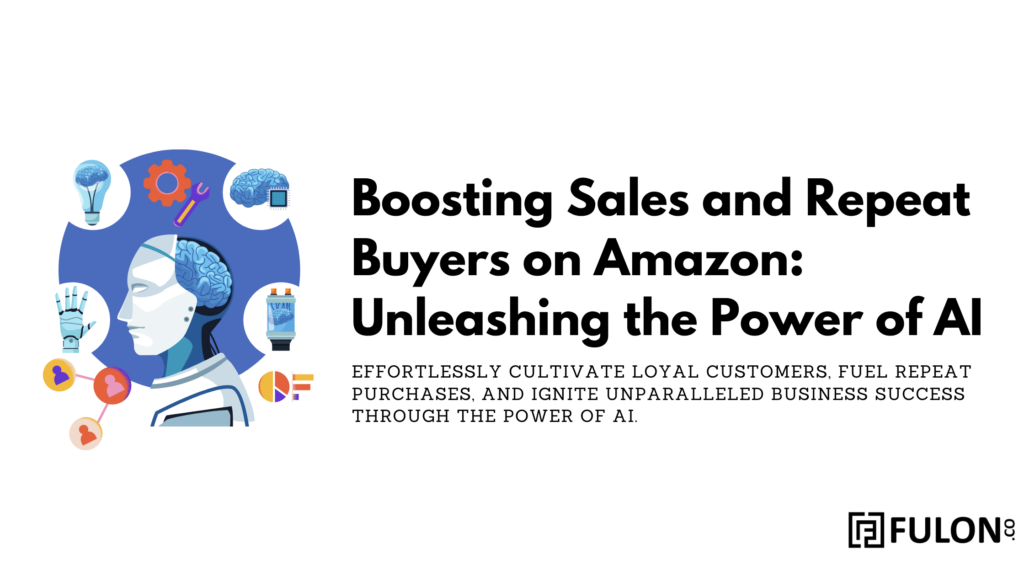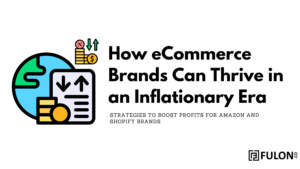Table of Contents
Introduction
By harnessing the power of cutting-edge technology, including AI and data analytics, brands can undergo a transformative journey in the realm of e-commerce. In this article, we will explore the exciting possibilities of e-commerce marketing and illuminate a multitude of ways in which businesses can leverage cutting-edge technology to thrive on Amazon.
Through the embrace of technology and data analytics, brands have the opportunity to enhance customer experiences, foster repeat business, and lay the foundation for sustained success in the online market.
AI and Ethics: Forging a Vital Connection to Shape the Future

While 80% of executives readily acknowledge the immense value of AI as a formidable competitive advantage, only 30% have taken the necessary steps to develop comprehensive strategies for effectively leveraging AI’s capabilities.
As brands, it is essential that we not only embrace AI but also consider the ethical implications of its implementation. By addressing these concerns with care, we can bridge the gap between the most promising AI applications and their tangible impact on e-commerce enterprises, fostering a harmonious blend of cutting-edge technology and ethical responsibility.
According to IBM, "Responsible training, together with an ethics by design approach over the whole AI pipeline, supported by a multi-stakeholder collaboration around AI, can make these systems better, not worse. AI is an ever-evolving technology. Therefore, for both the systems in use today and the systems coming online tomorrow, training must be part of a responsible approach to building AI. We don’t need a pause to prioritize responsible AI. It’s time to get serious about the AI ethics standards and guardrails all of us must continue adopting and refining."
Read more about “Don’t pause AI development, prioritize ethics instead”.
Supercharging Marketing Strategies: Unleashing the Potential of Predictive Modeling and Clustering in E-commerce

What is Predictive Modelling?
Predictive modeling is a popular statistical method for forecasting behavior. It involves creating a model by analyzing past and present data to forecast future results.
To stay ahead of the competition in the ever-changing landscape of e-commerce, smart and data-driven marketing strategies are required. This is where predictive modeling and clustering come into play. Not only do these two dynamic areas of AI offer a diverse set of tools and solutions, but they also significantly transform how e-commerce brands interact with their customers.
Brands can utilize predictive modeling to forecast customer behavior, anticipate trends, and make informed decisions. Moreover, with the help of machine learning algorithms, patterns can be analyzed, and actionable insights can be provided. These insights, derived from historical data, drive effective marketing campaigns. As a result, brands can engage customers in a more personalized and impactful way, ranging from personalized product recommendations to targeted promotions.
What is Clustering?
Clustering is a data science technique that combines data based on performance correlations. By utilizing clustering, brands can increase efficiency and maximize growth by gaining highly specific insights into the behaviors connected to each product.
On the other hand, clustering enables brands to better understand their customer segments and tailor their marketing efforts accordingly. By grouping customers based on shared characteristics, preferences, or behaviors, clustering algorithms empower brands to create targeted marketing campaigns that resonate with specific segments. Consequently, this approach not only improves customer engagement but also enhances conversion rates and customer satisfaction.
What makes these AI-powered techniques even more appealing is their accessibility. With the availability of user-friendly software tools and platforms, e-commerce brands of all sizes can easily capitalize on the potential of predictive modeling and clustering without requiring extensive technical expertise.
Elevating Customer Engagement: Segmentation and Customization Strategies for Repeat Purchases

Segmentation and customization are key strategies for increasing customer engagement and encouraging repeat business in customer-centric marketing. Different customer segments have different needs and preferences. Therefore, brands can create tailored strategies that appeal to each segment, ultimately fostering long-lasting loyalty.
To begin with, successful customer engagement relies on segmentation. By segmenting the customer base into distinct groups based on pertinent factors such as demographics, behavior, or purchase history, brands gain deeper insights into their audience. This information serves as a foundation for tailoring marketing campaigns and delivering offers and messaging that are relevant to the specific interests and problems of each segment.
Once the segments are identified, customization strategies come into play. For customers who have demonstrated low engagement or a low likelihood of repeat purchases, brands can employ a targeted nurturing strategy. This involves actively engaging with these customers, addressing their concerns, providing relevant information, and offering incentives for repeat purchases. By doing so, brands increase the likelihood of converting them into devoted repeat customers. The aim is to demonstrate genuine care and support, fostering a sense of loyalty and encouraging customers to choose the brand over rivals.
On the other hand, for customers with high engagement, the focus shifts to enhancing their experience and recognizing their loyalty. Brands can strengthen the bond with these customers by offering outstanding customer service, personalized surprises, privileged benefits, or early access to new products. By valuing and appreciating these customers and creating a sense of exclusivity, brands can cultivate long-term loyalty.
In summary, segmentation and customization are vital components of customer-centric marketing. Through segmentation, brands gain insights into their audience, enabling them to tailor their marketing efforts. Customization strategies then allow brands to engage customers at different levels of engagement, fostering loyalty and driving business growth.
Boosting Customer Engagement and Cultivating Loyalty

In the quest to maximize customer engagement and foster long-term loyalty, brands can leverage the potential of AI beyond predictive modeling alone. By carefully analyzing consumer behavior and preferences, brands gain valuable insights that can be used to improve the overall user experience. Consequently, this enables the implementation of efficient marketing campaigns and the delivery of personalized offers and targeted upsells.
Moreover, AI-powered tools provide additional avenues for brands to enhance their customer reach and engagement. For instance, leveraging lookalike audiences on social media platforms offers brands the opportunity to expand their reach to a larger audience. By identifying prospects who resemble their high-chance repeat buyers, brands can attract new customers with a higher conversion rate. This strategic approach not only broadens the customer base but also helps build a dedicated and loyal following, resulting in repeat sales and long-term growth.
In summary, by harnessing the capabilities of AI, brands can gain valuable insights into consumer behavior, enabling them to enhance the user experience and implement effective marketing strategies. Additionally, leveraging AI-powered tools like lookalike audiences can help brands extend their reach and attract new customers, ultimately fostering long-term loyalty and driving business growth.
Unveiling the Customer's Inner World: Unleashing the Potential of Psychographic Personas

Psychographic personas delve deeper into customers’ interests, attitudes, and opinions, going beyond the surface-level insights provided by demographics. By understanding the motivations behind purchasing decisions, businesses can establish deeper connections with their target audience.
AI integration enhances customer segmentation by incorporating personality traits and behavioral factors, taking businesses’ understanding to a new level. With AI-powered tools, businesses can analyze social media profiles and professional networks, extracting valuable data that can be used to predict individual personalities and preferences. Armed with this knowledge, businesses can tailor their sales and marketing efforts, creating campaigns that resonate with different personality types and maximizing their impact.
By utilizing psychographic personas and AI-driven insights, businesses can connect with customers on a deeper level, creating personalized experiences that leave a lasting impression. Understanding the complex tapestry of motivations allows businesses to forge strong emotional bonds and cultivate customer loyalty, ultimately driving growth and success in today’s competitive landscape.
Unleashing E-commerce Potential with Fulon
Fulon emerges as a game-changing ally for brands navigating the world of Amazon selling, offering a comprehensive suite of automation tools that redefine success. With the power of advanced data analytics, Fulon empowers brands to streamline operations, capitalize on invaluable customer insights, and execute personalized marketing campaigns. Moreover, by leveraging Fulon’s robust analytics capabilities, brands gain a deep understanding of their customer base. This, in turn, enables them to optimize marketing strategies and pave the way for revenue growth through repeat purchases.
In essence, Fulon revolutionizes the way brands approach Amazon selling by providing a holistic solution that combines automation and data analytics. By harnessing Fulon’s capabilities, brands can enhance their operational efficiency and gain a competitive edge in the marketplace. Through a data-driven approach, brands can uncover actionable insights that drive targeted marketing campaigns and foster customer loyalty. The result is a strategic advantage that propels brands towards revenue growth and long-term success on Amazon.
Ascend to new heights with a Results-Focused Approach to success measurement

Revolutionizing E-commerce Marketing: Unleashing the Power of Personalization
In the ever-changing world of e-commerce, AI-driven customer segmentation and the use of psychographic personas are the way of the future. By delving deeper into customer understanding, businesses can create personalized and targeted marketing campaigns that resonate with their target audience. This, in turn, elevates the customer experience, increases sales, and fosters long-term loyalty.
To thrive in the fiercely competitive e-commerce landscape, brands must not only embrace the power of AI tools and techniques such as predictive analytics and clustering, but they must also leverage them strategically. By employing these strategies, brands gain valuable insights into customer behavior and preferences. This enables them to deliver personalized recommendations, targeted promotions, and exceptional customer experiences that truly resonate with their audience.
Moreover, as brands venture into the realm of AI, ethical considerations play a crucial role. It is essential for brands to prioritize responsible AI development and ensure that ethical standards are upheld throughout the implementation process. By incorporating an ethics by design approach and fostering multi-stakeholder collaboration, brands can harness the power of AI while maintaining accountability and transparency, ultimately building trust with their customers and stakeholders.
Summary
In summary, the world of e-commerce marketing is evolving rapidly, and brands must adapt to stay ahead of the competition. By embracing cutting-edge technologies such as AI and data analytics, brands can unlock new opportunities for growth, enhance customer engagement, and cultivate long-term loyalty. Through the use of predictive modeling, clustering, segmentation, customization, psychographic personas, and AI-powered tools like Fulon, brands can optimize their marketing strategies, deliver personalized experiences, and achieve success in the dynamic realm of e-commerce.
Furthermore, it is important to remember that the future of e-commerce belongs to those who embrace innovation, leverage data-driven insights, and prioritize ethical considerations. By integrating AI into their marketing strategies, brands can not only gain a competitive edge but also create remarkable experiences for their customers.
So, are you ready to take your e-commerce marketing to the next level? Embrace the power of AI, harness the potential of data, and embark on a journey of growth and success in the dynamic world of e-commerce. The future is now, and with the right tools and strategies, the possibilities are truly limitless.







